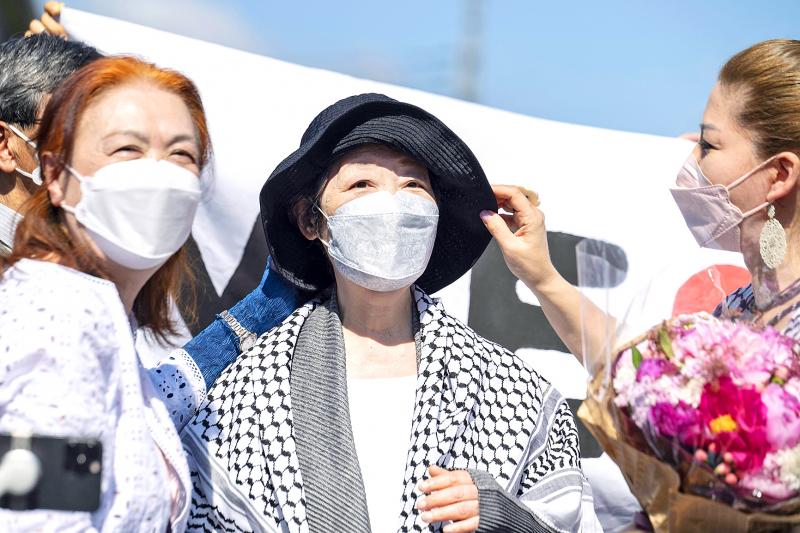Fusako Shigenobu, the 76-year-old female founder of the once-feared Japanese Red Army, yesterday walked free from prison after completing a 20-year sentence for a 1974 embassy siege.
Shigenobu was one of the world’s most notorious women in the 1970s and 1980s, when her radical leftist group carried out armed attacks worldwide in support of the Palestinian cause.
Shigenobu left the prison in Tokyo in a black car with her daughter, while several supporters held a banner saying “We love Fusako.”

Photo: AFP
“I apologize for the inconvenience my arrest has caused to so many people,” Shigenobu told reporters after her release.
“It’s half a century ago ... but we caused damage to innocent people who were strangers to us by prioritizing our battle, such as by hostage-taking,” she said.
She is believed to have masterminded the 1972 machine gun and grenade attack on Tel Aviv’s Lod Airport, which left 26 people dead and about 80 injured.
The former soy-sauce company worker turned militant was arrested in Japan in 2000 and sentenced to two decades behind bars six years later for her part in a siege of the French embassy in the Netherlands.
She had lived as a fugitive in the Middle East for about 30 years before resurfacing in Japan.
Shigenobu’s daughter May, born in 1973 to a father from the militant Popular Front for the Liberation of Palestine (PFLP), hailed her mother’s release on social media.
Shigenobu maintained her innocence over the siege, in which three Red Army militants stormed into the French embassy, taking the ambassador and 10 other staff hostage for 100 hours.
Two police officers were shot and seriously wounded. France ended the standoff by freeing a jailed Red Army guerrilla, who flew off with the hostage-takers in a plane to Syria.
Shigenobu did not take part in the attack personally, but the court said she coordinated the operation with the PFLP.
Born into poverty in post-war Tokyo, Shigenobu was the daughter of a World War II major who became a grocer after Japan’s defeat.
Her odyssey into Middle Eastern extremism began by accident when she passed a sit-in protest at a Tokyo university when she was 20. Japan was in the midst of campus tumult in the 1960s and 1970s to protest the Vietnam War and the Japanese government’s plans to let the US military remain stationed in the country.
Shigenobu quickly became involved in the leftist movement and decided to leave Japan at the age of 25.
She announced the Red Army’s disbanding from prison in April 2001. In 2008, she was diagnosed with colon and intestinal cancer, undergoing several operations.
Shigenobu yesterday said that she would first focus on her treatment, adding that he would not be able to “contribute to the society” given her frail condition.
“I want to continue to reflect [on my past] and live more and more with curiosity,” she said.
In a letter to a Japan Times reporter in 2017 she said the group had failed in its aims.
“Our hopes were not fulfilled and it came to an ugly end,” she wrote.

A fire caused by a burst gas pipe yesterday spread to several homes and sent a fireball soaring into the sky outside Malaysia’s largest city, injuring more than 100 people. The towering inferno near a gas station in Putra Heights outside Kuala Lumpur was visible for kilometers and lasted for several hours. It happened during a public holiday as Muslims, who are the majority in Malaysia, celebrate the second day of Eid al-Fitr. National oil company Petronas said the fire started at one of its gas pipelines at 8:10am and the affected pipeline was later isolated. Disaster management officials said shutting the

US Vice President J.D. Vance on Friday accused Denmark of not having done enough to protect Greenland, when he visited the strategically placed and resource-rich Danish territory coveted by US President Donald Trump. Vance made his comment during a trip to the Pituffik Space Base in northwestern Greenland, a visit viewed by Copenhagen and Nuuk as a provocation. “Our message to Denmark is very simple: You have not done a good job by the people of Greenland,” Vance told a news conference. “You have under-invested in the people of Greenland, and you have under-invested in the security architecture of this

UNREST: The authorities in Turkey arrested 13 Turkish journalists in five days, deported a BBC correspondent and on Thursday arrested a reporter from Sweden Waving flags and chanting slogans, many hundreds of thousands of anti-government demonstrators on Saturday rallied in Istanbul, Turkey, in defence of democracy after the arrest of Istanbul Mayor Ekrem Imamoglu which sparked Turkey’s worst street unrest in more than a decade. Under a cloudless blue sky, vast crowds gathered in Maltepe on the Asian side of Turkey’s biggest city on the eve of the Eid al-Fitr celebration which started yesterday, marking the end of Ramadan. Ozgur Ozel, chairman of the main opposition Republican People’s Party (CHP), which organized the rally, said there were 2.2 million people in the crowd, but

JOINT EFFORTS: The three countries have been strengthening an alliance and pressing efforts to bolster deterrence against Beijing’s assertiveness in the South China Sea The US, Japan and the Philippines on Friday staged joint naval drills to boost crisis readiness off a disputed South China Sea shoal as a Chinese military ship kept watch from a distance. The Chinese frigate attempted to get closer to the waters, where the warships and aircraft from the three allied countries were undertaking maneuvers off the Scarborough Shoal — also known as Huangyan Island (黃岩島) and claimed by Taiwan and China — in an unsettling moment but it was warned by a Philippine frigate by radio and kept away. “There was a time when they attempted to maneuver